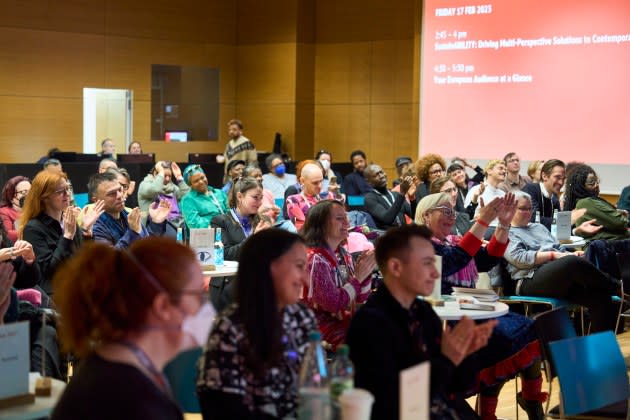European Industry at EFM Marks Progress, Setbacks in Push for Diversity and Inclusion: ‘This Is a Marathon, Not a Race’

The fight for diversity and inclusion takes center stage at this year’s European Film Market, which will host a day-long event Feb. 20 as part of a concerted, pan-European effort to open more doors in the continent’s screen industries.
This year’s Equity and Inclusion Pathways Seminar is the second of three annual events designed to push European stakeholders to make good on public promises to work toward a more diverse and inclusive film and television business.
More from Variety
Themba Bhebhe, head of diversity and inclusion at EFM, said this year’s edition is “both a response and a consolidation of the foundations that were laid out last year,” when the inaugural event provided “a cartography and a snapshot of the needs and demands of marginalized film professionals in Europe.”
At the conclusion of last year’s edition — a spirited day of dialogue and debate that brought together more than 100 industry reps from across the continent — attendees passed five resolutions that sought to create better frameworks for Europe’s policymakers and screen industries, centered around creating more equitable and inclusive structures.
One year on, stakeholders are reflecting on both the gains and setbacks in trying to dismantle decades-old structures in Europe that have frequently privileged a select few.
“There’s definitely a lot more diversity, but what we’re not seeing more of is inclusion,” says Victoria Thomas, of the Anti-Racism Taskforce for European Film (ARTEF). “A lot of organizations are comfortable with having people that may look different. But I think bringing different ideas and different ways of thinking into the room, that is definitely still a challenge.”
Representatives from ARTEF, which was launched in the wake of the protests in the U.S. and abroad sparked by the 2020 murder of George Floyd, are among the nearly 250 industry delegates who were invited to attend this year’s seminar, which will assemble decision-makers from key European institutions, such as national film boards, broadcasters, public funders and film commissions. Advocacy groups representing the interests of various groups seeking greater equity in the continent’s screen industries will also have a robust presence, including France’s Collectif 5050, Germany’s OMNI Inclusion Data, the Brown Girls Doc Mafia and the European Audiovisual Entrepreneurs (EAVE).
For Europeans, the stakes couldn’t be higher, according to Kristina Trapp, CEO of the European Audiovisual Entrepreneurs (EAVE). “Even though our European film industry congratulates itself for being inclusive and welcoming, the reality is very white in terms of decision-making power, access to financing and opportunities,” she says. “In this respect, Europe is lagging behind when compared to other parts of the world.”
But for the continent to catch up, the first step is an honest reckoning of how much work remains to be done, according to Thomas. She describes a “false sense of security” spurred by the “collective reckoning because of COVID and George Floyd,” when industry gatekeepers — faced with increased scrutiny from minority and marginalized groups — seemed inclined to offer more stakeholders from those groups a seat at the table.
Some of those calls, she says, opened the door for greater dialogue around how to reimagine existing power structures in Europe’s screen industries. Increasingly, though, Thomas says she’s witnessing pushback — particularly from those who remain determined to protect the status quo.
“I feel like there are parallel movements,” she says. “There are people involved in the conversation, who are still carrying on and trying to make the change. But I think what we’re also seeing and hearing a lot more of is the resistance. I think the resistance is now a lot louder than it used to be,” she continues. “Once upon a time, people were entertaining the diversity and inclusion conversation and not necessarily opposing it. I think nowadays, the opposition is louder, and it’s coming in the form of, ‘What about me?’”
Producer Tamara Dawit, who spearheaded diversity and inclusion efforts in her former position at the Canada Media Fund and works with EAVE in an advisory role, criticized the “box-ticking efforts” made by many organizations when Equality, Diversity and Inclusion (EDI) was the “sexy issue” four years ago.
“We’ve seen it in the U.S., in the big studios, in the tech sector, in corporate America, in the U.K.,” she says, “all of these EDI roles where the people left, and then suddenly that job or that department or that function was completely forgotten about.”
Nevertheless, “people are more fired up than ever,” she says, pointing to how a public outcry pushed the Berlin Film Festival to reverse course on its decision to invite members of Germany’s far-right AfD party to the opening ceremony.
“This is a marathon. It’s not a race,” Dawit says. “And we have to do things slowly and with intention, so that they’re meaningful to the people that this change [affects].”
“I am hopeful because the conversation is still going on,” adds ARTEF’s Thomas. “But I do think that the day we no longer need to talk about diversity will be the day that we’ve won.”
Best of Variety
Sign up for Variety’s Newsletter. For the latest news, follow us on Facebook, Twitter, and Instagram.
